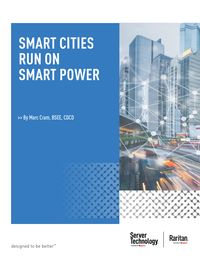A cooperative effort between city governments and private enterprise is leading cities to adopt the goal of becoming “smart cities.” While the definition of a smart city depends on who you ask, the common understanding seems to be that a smart city provides for the real-time monitoring and control of the infrastructure and services that are operated by the city, thereby reducing energy use, reducing pollution, improving public safety, and improving the quality of life for the citizens and visitors of the smart city.
In smart cities, remotely managed power distribution provides a means of reducing power consumption, resetting disparate hardware systems, and providing localized environmental monitoring for both the control systems and the networking hardware that make a city “smart.” This paper explores the critical role intelligent power distribution plays in making “smart” happen.

